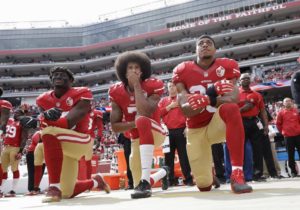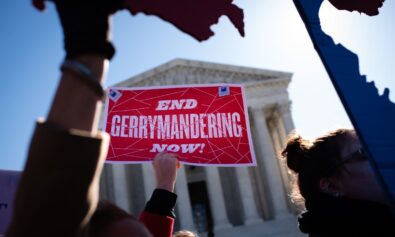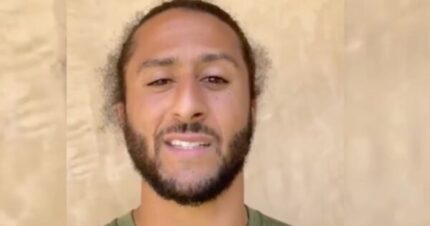
FILE – In this Oct. 2, 2016, file photo, from left, San Francisco 49ers outside linebacker Eli Harold, quarterback Colin Kaepernick, center, and safety Eric Reid kneel during the national anthem before an NFL football game against the Dallas Cowboys in Santa Clara, Calif. What started as a protest against police brutality has mushroomed a year later into a divisive debate over the future of Kaepernick who refused to stand for the national anthem and now faces what his fans see as blackballing for speaking out in a country roiled by racial strife. The once-rising star and Super Bowl quarterback has been unemployed since March, when he opted out of his contract and became a free agent who could sign with any team. (AP Photo/Marcio Jose Sanchez, File)
Discussions on why a National Football League team may or may not choose to draft or sign a player are typically not newsworthy enough to appear anywhere but the sports section. Occasionally, however, a situation emerges that deserves front page coverage.
Trying to understand the reasons why Colin Kaepernick is still unsigned is one of those stories. A Super Bowl quarterback that threw for 16 touchdowns last season with only four interceptions on 331 passing attempts, Kaepernick currently ranks higher than eight potential starters in ESPN’s 2017 quarterback assessment. In a year where quarterback talent is a rarity and where several teams have noticeable holes in their rosters at their starting quarterback position as the preseason ends, the fact that one of the best unsigned quarterbacks today cannot find a team is confusing. Kaepernick, a two-time NFC Championship quarterback with one of the best touchdown-to-interception ratios in the history of the league, may never play again in the NFL due to his protest of police brutality and support of the Black Lives Matter movement seems unimaginable.
“Kaepernick has not been charged with a crime. He has not been accused of violating any aspect of the league’s collective bargaining agreement. He’s done nothing more than exercise his right to protest peacefully, which is protected by the Constitution,” Jason Reid wrote for the Undefeated regarding the Seattle Seahawks’ refusal to sign Kaepernick, a vetted starting quarterback, as their reserve quarterback. “Yet, Seahawks decision-makers found it more palatable to potentially entrust their team, with the current roster’s shrinking championship window, to guys better suited to be third-stringers than Kaepernick, who at the very least has shown he’s capable of being better than any primary backup on the league’s 32 teams.”
While this issue is, at least on the surface, a story about a Black man’s right to speak out against the injustices he perceives, it is also a story about how political and corporate interests intersect and foil free expression in this country. The challenges Kaepernick faces today were met by others before him and will likely be met by others persons of conscience following him.
“There are a lot of things that are going on that are unjust [that] people aren’t being held accountable for,” Kaepernick said in defense of his protest. “And that’s something that needs to change. That’s something that this country stands for — freedom, liberty, justice for all. And it’s not happening for all right now.”
Kaepernick has a lot of cause to be upset. In 2016 alone, 17 unarmed African-Americans were shot and killed by the police. These include Terence Crutcher, who was shot with his hands up as he approached his SUV in Tulsa, Oklahoma; Peter Gaines, who was shot after lunging at an officer following vandalizing a traffic sign in Houston, Texas; and Antronie Scott, who was shot when turning towards the police with a cellphone in his hand in San Antonio, Texas.
Per one study, there are more than 1,000 police-involved shooting in each year. Of these, African-American men are three times more likely to die by police use of force. From 2005 to April 2017, there have been only 80 officers charged with murder or manslaughter for on-duty shootings. Of these, only 35 percent are convicted. Accountability carve outs — such as various U.S. Supreme Court rulings, blaming police training for officers’ conduct, and permissive use of force laws, such as “Stand Your Ground” — have made it difficult for juries to rule police officers guilty.
Conservatism in sports
Kaepernick is not the only one to protest the national anthem in 2016. While Kaepernick opted to sit through all of the games in the 2016 San Francisco 49ers’ schedule, by the final game of the preseason he was joined by the Seattle Seahawks cornerback Jeremy Lane. On Week 1 of the regular season, eleven players joined the protest, with then-Denver Broncos receiver Brandon Marshall taking a knee during the anthem at the nationally televised Kickoff Game. Players continue to protest to this day by not standing for the anthem; Cleveland Browns tight end Seth DeValve, the first white player to not stand for the anthem in this protest, took a knee for the anthem in a preseason game against the New York Giants on August 21, 2017.
DeValve’s knee came at the call to action of Seahawks defensive end Michael Bennett, who called for white players to join the continuing protests. “It would take a white player to really get things changed, because when somebody from the other side understands and they step up and they speak up about it. … It would change the whole conversation,” Bennett said to ESPN’s SC6.
“The issue is that it doesn’t provide equal opportunity to everybody, and I wanted to support my African-American teammates today who wanted to take a knee,” DeValve said after the game, stating that the United States is “the greatest country in the world.” “We wanted to draw attention to the fact that there’s things in this country that still need to change.”
The protests present the NFL with a no-win situation: On one hand, ignoring the players’ concerns and cracking down on the protests make the league look like it does not respect individual freedoms or, worse, supports the discrimination the protests seek to highlight. On the other hand, the NFL risks alienating its fan base by supporting the protests.
An analysis by Bloomberg Politics and Resonate found that the fans of 23 NFL teams are likely to vote Republican more often than they publicly admit to, compared to six teams that have fans that vote Democratic more often than they admit. Per a 2007 analysis by Experian Simmons, the NFL Super Bowl fan base is 64 percent male, 50 percent likely to have a household income between $60,000 and $249,999 per year, 41 percent Republican (compared to 38 percent Democrat), and 83 percent white.
This has led to the argument that the NFL may be the most politically conservative-minded league in America. “Why does the NFL have such a tenacious hold on the national consciousness — particularly that of white males, the primary fans of professional sports?” Neal Gabler asked in 2014. “It might be that the NFL, in both its high points and its low ones, encapsulates the prevailing white male conservative ethos of modern America better than any other league. The triumph of the NFL is a tribute to the triumph of American conservatism.
“No other professional league seems to exhibit the indifference, even contempt, to its own players that the NFL does to its athletes — which is why the former players have filed their suit. The record of concussions and the use of painkillers demonstrate that to the NFL — and many of its fans — players are essentially expendable, interchangeable, to be used up and then discarded. The fact that football players have never established a powerful union, as baseball and basketball players have, only shows how much those players have drunk the league’s Kool-Aid.”
When judging the NFL’s response to the anthem protest, it should be noted that other leagues had similar protests that drew less condemnation. During the 2016 ESPY Awards, for example, the National Basketball Association’s LeBron James, Carmelo Anthony, Dwyane Wade, and Chris Paul all took the stage in support of the Black Lives Matter movement. NBA players have also sported Black Lives Matter warm-up shirts before games, although there have been no noticeable examples of basketball players refusing to stand during the anthem.
This is also not the first time the national anthem was protested. During the 1968 Summer Olympics, 200 meters gold medalist Tommie Smith and bronze medalist John Carlos raised gloved fists as the “Star-Spangled Banner” was played for their medal ceremony. Kareem Abdul-Jabbar opted not to stand for the national anthem at UCLA basketball games, leading to the decision to play the national anthem before the players took the court for the UCLA-University of Washington game. In 1996, Mahmoud Abdul-Rauf of the NBA’s Denver Nuggets began refusing to stand for the anthem, a protest he described at the time as opposing America’s history of oppression. The NBA briefly suspended Abdul-Rauf for his actions.
Freedom of speech
Many would argue that the controversy surrounding Kaepernick centers on the political struggles the nation is facing in the Trump era. Donald Trump has personally taken credit for Kaepernick’s failure to be signed, arguing that NFL owners fear receiving a “nasty tweet” from him. With many players, coaches, and owners claiming support of Trump, there may be weight to this claim.
Kaepernick has indicated that he would not continue his protest should he be re-signed, saying that he does not want it to be a distraction. Despite this, one must ask if a company truly has the right to curb an employee’s inconvenient free speech.
In August, Google fired software engineer James Damore for arguing in an anti-diversity manifesto that there are biological reasons behind the gender inequality in the tech industry. While the U.S. Constitution only protects free speech from governmental agency, one must ask if there is space in the public conversation to have divergent opinions.
“Free speech is protected, however, the consequences of our words are not protected,” Demetria Miles-McDonald, the founder and CEO of Decide Diversity, told Atlanta Black Star. “The question in Colin Kaepernick’s case is whether his speech is infringing on the rights of others. Kaepernick is standing up for the rights of oppressed people. If the engineer at Google took a nonviolent stance in favor of women engineers, he would receive a promotion. What is happening with Kaepernick is wrong.”
As the NAACP takes up Kaepernick’s cause, the question at hand may not be not if Kaepernick should be signed to a team. In practical terms, the window for Kaepernick to be signed to play in the 2017-2018 season has passed. Even if he were to be signed today, it would be unlikely that he could learn the playbook in time to be competitive.
The question at hand may be if a person has the right to address his conscience, even when it is inconvenient to do so. “Everyone has their First Amendment rights, and by opposing a flag that he feels oppresses black people and people of color, he’s standing for all of us — the minorities and the social injustices throughout the country,” Ann Hart, president of the Maricopa County, Arizona, NAACP, told Sports Illustrated. “It’s stellar and honorable that he’s done it, and to be able to stand alone when the world is against you, and now that he has the support of many other organizations, it should have brought more attention to the fact that there’s something wrong with this picture.
“You have someone that’s not [playing in the NFL], and you have more egregious acts that have happened in other organizations. Look at our current White House administration, where there have been blatant comments that are bigoted, racist, misogynist, denigrating, the whole nine yards, and it’s coming from our highest executive in the land. And this man [Kaepernick] is simply taking a knee.”
It may be that there is no easy answers to Kaepernick’s predicament. Free speech does not exist as a guaranteed right in the private sector, and a company has a right to control its image, but we as a society expect the rights of the individual to be respected. There may be no bow that can be tied around on this issue. This is why talking about this publicly is so important. Maybe, it is time to extend free speech protections, but we will never know unless we discuss it.


